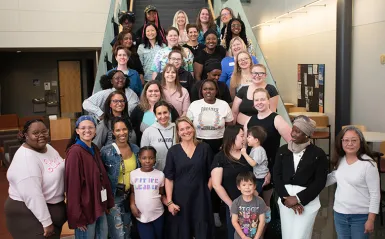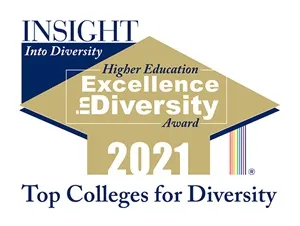The Diversity, Equity, Inclusion (DEI) Department offers a variety of initiatives for students and the NHCC community. We encourage you to connect with us and participate in these opportunities.
North Hennepin Community College stands firm against racism and all forms of human oppression. Learn more about our commitment to racial equity, self-care resources, and our work.
North Hennepin Community College is dedicated to upholding anti-racist and inclusive work practices and moving toward systems that benefit us all. We acknowledge that we are on Indigenous land, the traditional territories of the Dakota people. We recognize that human diversity is a fundamental strength of our community and that racism and oppression have caused the long-lasting and grievous harm of historical trauma. North Hennepin Community College, together with historically marginalized communities, is committed to advancing racial equity, closing the opportunity gap, and improving college access to communities that experience racial inequities. North Hennepin Community College will incorporate racial equity as a standard part of decision-making processes as we strive for a complete state of physical, mental, and social wellbeing across the student and employee experience.
North Hennepin Community College stands firm against homophobia, transphobia, and gender-based violence in all its forms. We are committed to cultivating a campus environment in which lesbian, gay, bisexual, transgender, nonbinary, two-spirit, asexual and queer students, staff, and faculty have safety, representation, inclusion, and equity. We actively foster the academic and personal success of LGBTQIA2+ students through programming, services, and support, while simultaneously deepening the campus community's understanding and appreciation of LGBTQIA2+ people and issues. Our dedication extends to upholding queer joy and implementing trans-inclusive practices in all aspects of our work. We pledge to persistently continue to work toward creating a strong culture of resistance against oppression in all its manifestations.
North Hennepin Community College, as a diverse, equitable and inclusive community, is committed to upholding a campus culture that is respectful and welcoming. In light of COVID-19, we are aware of the racial stigmatization happening on many campuses towards individuals of Asian descent. At North Hennepin Community College, discrimination, bias treatment or harassment toward our Asian community members will not be tolerated. If you are a student or employee and have experienced or witnessed an incident of discrimination or bias, please submit this complaint form. We are dedicated to upholding anti-racist practices, and we recognize that the richness of our diversity is our fundamental strength. Learn more about the college's discrimination policy.
Diversity & Equity Blog – Visit the Diversity & Equity Blog to view student-written pieces, access support spaces, self-care tips, and more!
Work-study students employed by the Diversity Department, design and create topical presentations salient to their identity. Topical subjects as listed below include gender, race, and religion. Presentations are accessible to the entire campus community (streamed online or in person) and are created to foster awareness, dialogue, and cultural understanding to help build inclusion. Diversity Student Leaders may also be tasked with organizing meetings, student outreach/promotion, assisting with other Diversity Initiatives, serving on the Indigenous Student, Student of Color (ISSC) Advisory Board, and other duties as assigned. Students hired for these positions are expected to serve as positive role models and always embody good stewardship. We welcome students to apply who are passionate about diversity, equity and inclusion, and who personally resonate with a topic below. Interested students should email justice.fisher@nhcc.edu for more information.
Topical Presentation Subjects
- American Indian Education
- Asian Heritage
- Black Men
- Global Salaam
- Latino Success
- Women and Women of Color
Students interested in leading an alternative topic not listed above are encouraged to send their interest to one of the email addresses listed above.
- Let’s Talk About Race – Employee forum
An interactive opportunity to critically discuss current events and topics specific to race and racial advocacy. “What will you do?” is the foundational question that will drive our solution-oriented conversations. Our goal is to illuminate personal change-agency that drives community action. Meets monthly. - C.O.R.E. (Conversations On Race & Equity) – Student forum
An opportunity for students to engage in critical dialogue on issues relevant to race, equity and advocacy. The goal is to serve as a springboard for civic engagement and to empower the next generation of change advocates. Meets bi-weekly. - Racial Healing Circles – Employee forums, student forums, and community forums
Rooted in indigenous tradition, this compassion-based platform provides opportunity for sharing lived truths, and emphasizes active listening and being open to differing perspectives. The goal is to promote understanding, racial healing and racial equity. Meets monthly.
The Association of American Colleges and Universities (AAC&U) selected North Hennepin Community College to participate in their Truth, Racial Healing & Transformation (TRHT) Institute June 16-19, 2020. The selection partners us with AAC&U to maximize equitable community building through racial healing using the TRHT framework. NHCC will receive a network of support and national evaluators to guide the development of purposeful action that dismantles racial hierarchies and structural barriers, both within the campus and local community. NHCC was selected based on our demonstrated commitment to racial equity.
Representatives included:
• NHCC Associate Vice President of Equity & Inclusion, Dr. Eda Watts
• Brooklyn Park Assistant City Manager, Wokie Freeman-Gbogb
• NHCC Chief Human Resource Officer, Vickie DeFord
• NHCC-MSCF Chapter President, Sara Van Asten
• NHCC Director of Access Services and Tutoring, Tom Lynch
• NHCC Dean of Student Development, Lindsay Fort
• NHCC Interim Dean of Fine Arts, Languages and Communications, Kathy Hendrickson
• NHCC Dean of Science, Math and Health Science, Jayant Anand
Brother 2 Brother (B2B)
Brother 2 Brother (B2B) is a student-led chapter of the African American Male Education Network & Development (A²MEND), a nationally recognized organization focused on mentorship, leadership, and academic success. B2B is a research-based initiative designed to support and empower men of color as they navigate higher education, while remaining inclusive and welcoming to all students seeking personal growth, community, and professional development.
Through mentorship, coaching, scholarships, tutoring, and weekly check-ins, B2B helps students define, pursue, and achieve their educational goals. Together, NHCC and B2B are building a campus culture where every student has the support, encouragement, and resources needed to thrive, in college and beyond.
Sista Hope 2
Find connection, coaching, and community with a student-led sisterhood focused on the development, retention, and graduation of female-identifying students of color. SISTA HOPE 2 offers bi-weekly meetups, mentorship, tutoring, leadership opportunities, and funded activities, plus direct links to NHCC academic, financial, and career resources. Join us for workshops, retreats, and peer support that uplift your journey from day one to graduation.
Be Bold Break the Mold
This professional mentorship program supports female-identifying students in degree pathways for computer science, pre-engineering, construction management, and criminal justice. Student mentees are awarded a stipend after successful completion of the program. Mentors and mentees meet 1:1 each month and also gather as a group regularly to discuss topics related to self-advocacy, self-promotion, and empowerment.
Be Bold, Break the Mold applications may be submitted mid/late August for the upcoming academic year. Check out the BBBM Application Form for more information and to apply to the program.
Men Who Care
The Men Who Care program offers opportunities for students who identify as male to explore nontraditional careers in health, human services, and education industries through participating in tours at local organizations. Event information will be posted during the fall semester.
UPlift programs
UPlift programs address traditional gender-based barriers faced by women. Program goals are to engage, encourage and empower women. Programs for: students, employees, and allies.
- UPlift SISTERS – *BIPOC Students
Provides women-focused mentorship, guidance, support and peer-connection! Learn self-advocacy and how to navigate male dominated spaces. We also make the time to honor your personal and academic accomplishments. Led by Dr. Eda Watts and Dr. Nerita Hughes. *Themes specific to Black, Indigenous and people of color. - UPlift Women – Employees
Offering a support network that strengthens connection, builds advocacy and professional leadership skills. Open to all NHCC women employees. - UPlift Her Men Allies - Employees
A space for NHCC men employees to learn how to be supportive allies and interrupt gender bias. Learn to recognize the intersectionality of race, the heighted issues faced by Black women, and how to push for parity.
To provide an inclusive, respectful, and inviting learning and work environment at NHCC by creating opportunities for interaction, dialogue, and inclusion among and across diverse cultures, including:
- Mission
To provide an inclusive, respectful, and inviting learning and work environment at NHCC by creating opportunities for interaction, dialogue, and inclusion among and across diverse cultures, including:
- Academic diversity initiatives for students that complement academic instruction in the classroom
- Multicultural education trainings that encourage and advance inclusive language, respect, interaction, and cultural knowledge
- Innovative ideas and publicity that promote the value of diversity
- Community connections that expand knowledge, networking, and resources
- Collaboration by representing a voice of diversity and inclusion on campus committees
- Vision
To promote the values of diversity, inclusion, and cultural competence as well as our civic responsibility in advancing these values outside of campus. Through diversity awareness and inclusion efforts, NHCC owns, maintains, and advances an inclusive, respectful, and inviting learning and work environment.
There may be many definitions of the words or phrases below, but the definitions provided indicate how the Strategic Inclusion Committee has defined them for the purposes of this document.
Academic Success
The demonstration of student achievement in higher education through a series of indicators including, but not limited to, grade point average, rigorous coursework, acceptance to program major, persistence towards graduation, and graduation.
Access(ible)
Refers to a student’s opportunity to participate in all of the education-related offerings provided by an educational Institution. Traditional access-related initiatives in higher education seek to remove barriers and provide support for historically underserved or underrepresented students.
Affinity Groups
Groups or programs that connect individuals based on interests, identities, and circumstances. Such programs can be especially helpful to first-year students and students from underrepresented backgrounds.
Campus Climate
The cumulative and continuing perception of the context in which the current attitudes, behaviors, and standards of faculty, staff, administrators, and students concerning the level of respect for individual needs, abilities, and potential are felt.
Co-curricular Learning
Learning that takes place outside of a traditional classroom model (or curriculum) that directly relates to or enhances one’s understanding of the targeted content area. Examples of co-curricular programs include study abroad, internships, symposia, conferences, and lectures.
Cultural Competence
Cultural Competence is the policies and practices of an organization, or the values and behaviors of an individual, that foster effective cross-cultural communication. It is a point on a continuum that ranges from cultural destructiveness to cultural proficiency. A culturally competent organization values the people who work there, understands the community in which it operates, and embraces its clients as valuable members of that community. This means that the culture of the organization promotes inclusiveness and institutionalizes the process of learning about differences. Cultural competence suggests a willingness to expand the organization’s paradigm for culture.
Members of an organization with cultural competence as a goal examine their own cultures to understand how they, as cultural entities, impact the perception and interaction of those who are different. This means identifying the dynamics of difference caused by historical distrust. Clearly understanding who we are and accepting how others perceive us is one of the first steps towards cultural competence. The next step is the same underlying, non-defensive examination of the organization’s culture.
Culturally Relevant/Responsible
Recognizing, understanding, and applying attitudes and practices that are sensitive to and appropriate for people with diverse backgrounds, experiences, and perspectives.
Culture
Denotes the way of life of a group of people, encompassing their ideas, values, beliefs, norms, language, traditions, and artifacts.
Diversity
Minnesota State Colleges and Universities recognizes and respects the importance of all similarities and differences among human beings. The system and its institutions are committed, through their programs and policies, to fostering inclusiveness, understanding, acceptance, and respect in a multicultural society. Diversity includes, but is not limited to, age, ethnic origin, national origin, race, color, sex, sexual orientation, gender identity, gender expression, marital status, disability, religious beliefs, creeds, and income. Minnesota State Colleges and Universities is committed to confronting prejudicial, discriminatory, or racist behaviors and policies.
Domestic/Local Multicultural Experiences
Off-campus engagement opportunities with diverse communities (racially, culturally, socioeconomically, religiously, etc.) within the state of Minnesota or within the United States. This distinction was made in response to traditional immersion activities outside of the United States or what is more commonly referred to as study abroad.
Early Alert
A system in which faculty can log student behaviors that have been deemed strong indicators for dropping out or stopping out from college. Such systems have become more popular in higher education as institutions seek to improve their abilities to identify high-risk behavior.
Equity/Equitable
The proportional distribution or parity of desirable outcomes across groups. Sometimes confused with equality, equity refers to outcomes, while equality connotes equal treatment. Where individuals or groups are dissimilarly situated, equal treatment may be insufficient for or even detrimental to equitable outcomes. An example of equity is individualized educational accommodations for students with disabilities, which treat some students differently in order to ensure the equitable access to education.
Ethnicity
The shared sense of common heritage, ancestry, or historical past among an ethnic group. Ethnicity is a distinct concept of race, as Illustrated by the fact that Hispanics, designated an ethnic group In the United States may nevertheless be of any race. In accordance with the Office of Management and Budget definition of ethnicity, the U.S. Census Bureau defines ethnicity or origin as “the heritage, nationality group, lineage, or country of birth of the person or the person’s parents or ancestors before their arrival in the United States.
First-generation Student
A student whose parent(s)/legal guardian(s) have not completed a bachelor’s degree at a four-year college or university.
Global
Activities, events, programs, and other learning experiences that are directly connected to international communities, cultures, and contexts.
Inclusion
Organizational strategies and practices that promote meaningful social and academic interactions among persons and groups who differ in their experiences, their views, and their traits. Expanding upon efforts that promote diversity on the basis of demographic differences.
(Inter) Cultural Competence
An ability to learn about and interact effectively with people of diverse backgrounds, experiences, and perspectives. This competence comprises four components: (1) awareness of one’s own cultural worldview, (2) attitude towards cultural differences, (3) knowledge of different cultural practices and worldviews, and (4) cross-cultural skills.
Intercultural Engagement
Refers to educational opportunities, events, and programs that invite individuals to step into new cultural contexts with the intent of developing greater cultural competence.
Intergroup Dialogue
A facilitated, face-to-face discussion with the objective of creating new levels of understanding, relating, action between two or more social identity groups.
Interreligious Engagement
Events, projects, and curriculum designed to support activities related to the study and practice of religion in comparative and cross-cultural contexts.
Learning Communities
A group of people actively engaged in learning together, from each other, and by habituation. Learning Communities often consist of two courses linked together to explore common themes and encourage partnerships with professors and peers.
Multicultural
Refers to a collective variety of cultures that can be defined along racial, sex, class, sexual orientation, gender identity, gender expression, language, religious, and education lines. Goals for multicultural education vary along a continuum that includes demographic inclusion, student empowerment, intergroup understanding, educational equity, and social transformation.
Personal Safety
A person’s sense of safety as it relates to social, intellectual, physical, and cultural interactions, and spaces.
Safe Spaces
Spaces where students, community members, and employees feel socially and physically safe to represent their full identities and share their unique perspectives.
Underrepresented
Any individuals who are historically underrepresented in American higher education in terms of: race/ethnicity/ nationality, gender, parental education level, socioeconomic status, disability, sexual orientation, gender identity, gender expression, age, or spirituality/religiosity/philosophy.
These key terms and definitions were provided by MinnState, Appendix C, Diversity and Equity Strategic Planning Toolkit.
Diversity, Equity, Inclusion Events
Affinity Group Lunch
Staff and faculty affinity group lunches are in the Campus Center (CC 244).
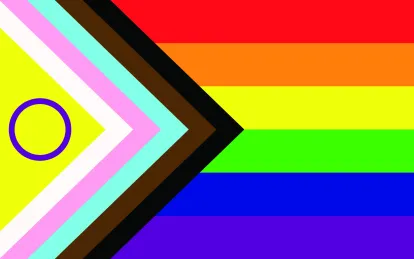
Queer Affinity Lunch
Sept. 17 | 12:00-1:00 p.m.
Oct. 15 | 12:00-1:00 p.m.
Nov. 12 | 12:00-1:00 p.m.
Dec. 17 | 12:00-1:00 p.m.
Facilitated by Justice Fisher & Christie Kopietz
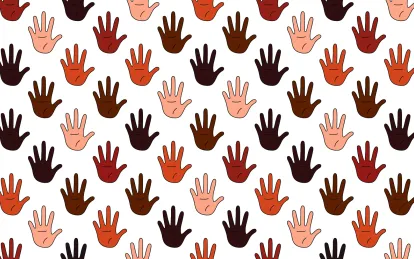
BIPOC Affinity Lunch
Sept. 4 | 12:00-1:00 p.m.
Oct. 9 | 12:00-1:00 p.m.
Nov. 6 | 1:30-2:30 p.m.
Dec. 4 | 12:00-1:00 p.m.
Facilitated by Candice Bartelle, Brenda Vue, & Mike Mui
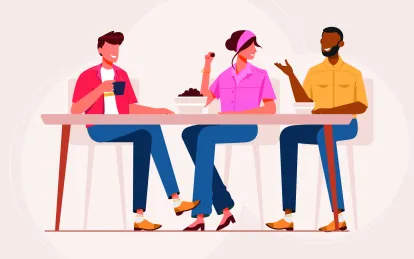
Staff and Faculty Lunch
Sept. 8 | 12:00-1:00 p.m.
Oct. 13 | 12:00-1:00 p.m.
Nov. 10 | 12:00-1:00 p.m.
Dec. 8 | 12:00-1:00 p.m.
Facilitated by Brittany Kiser & Mike Mui
Diversity Minute
The purpose of Diversity Minute is to raise your awareness on issues of diversity, equity and inclusion because it matters…to all of us. The goal is to help you be a better-informed change agent, ally and friend who can come alongside to build inclusive and just communities where we can all thrive.
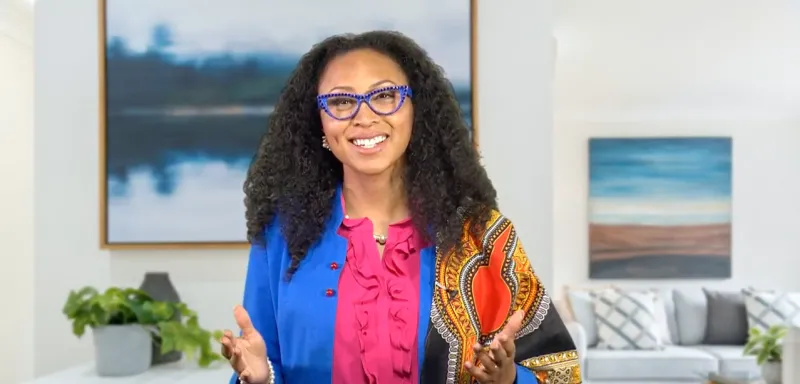
National 'HEED' Diversity Award Recipient
NHCC is proud to be a recipient of the 'HEED' National Diversity Award for our commitment to racial equity. Learn more about the award.
Minnesota State Equity 2030
North Hennepin Community College is committed to Minnesota State's goal of Equity 2030, which is a bold, strategic vision to close the educational equity gaps across race and ethnicity, socioeconomic status, and geographic location by the end of the decade at every Minnesota State college and university.
Gender Neutral Bathrooms
NHCC offers several genders-neutral bathrooms, also known as all-gender, gender-inclusive, or unisex restrooms. These can be used by anyone regardless of gender identity or expression.
Contact Us
Location & Contact
Eda Watts
Associate Vice President of Equality and Inclusion
Location:
Campus Center (CC) 103
Phone:
763-424-0944
Email:
Eda.Watts@nhcc.edu
Hours
Check winter break hours Dec. 22 - Jan. 10
In-person & virtual
Monday: 8:00 a.m. - 4:30 p.m.
Tuesday: 8:00 a.m. - 4:30 p.m.
Wednesday: 8:00 a.m. - 4:30 p.m.
Thursday: 8:00 a.m. - 4:30 p.m.
Friday: 8:00 a.m. - 4:30 p.m.
Saturday: Closed
Sunday: Closed



